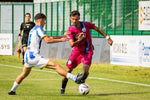
Iron Supplements for Soccer Players: Addressing Anemia and Fatigue
, by Sandesh Prasannakumar, 8 min reading time
Stay tuned, Your Favourite supplements will be back in stock soon!
Stay tuned, Your Favourite supplements will be back in stock soon!
Stay tuned, Your Favourite supplements will be back in stock soon!
Stay tuned, Your Favourite supplements will be back in stock soon!
Stay tuned, Your Favourite supplements will be back in stock soon!
Stay tuned, Your Favourite supplements will be back in stock soon!
Stay tuned, Your Favourite supplements will be back in stock soon!
Stay tuned, Your Favourite supplements will be back in stock soon!
Stay tuned, Your Favourite supplements will be back in stock soon!
Stay tuned, Your Favourite supplements will be back in stock soon!

, by Sandesh Prasannakumar, 8 min reading time
Soccer is a physically demanding sport that requires players to maintain high energy levels, stamina, and overall health. Iron intake is a crucial aspect of a soccer player’s nutrition, as adequate iron levels are essential for optimal performance. In this article, we will explore the significance of iron supplements for soccer players, focusing on how they can help address anaemia and fatigue.
Iron is a vital mineral that is critical in numerous bodily functions. It is primarily responsible for transporting oxygen via haemoglobin, the protein found in red blood cells. This oxygen transport is essential for energy production and overall athletic performance. When iron levels are low, athletes may experience fatigue, decreased endurance, and increased risk of injury.
Anaemia is a condition characterised by a lack of healthy red blood cells to carry adequate oxygen to the body’s tissues. One of the most common types of anaemia is iron deficiency anaemia, which occurs when the body does not have enough iron to produce sufficient haemoglobin. Symptoms of anaemia can include:
These symptoms can severely impact soccer players' performance, leading to decreased stamina and an increased likelihood of injury.
Several factors can contribute to iron deficiency in soccer players:
Intense training and competition can increase the body's demand for iron. The more physically active an individual is, the more oxygen their muscles require, which can deplete iron stores.
Many athletes may need to consume more iron-rich foods in their diets. This is particularly common among vegetarians and vegans, as the body less readily absorbs plant-based iron (non-heme iron) than animal-based iron (heme iron).
Soccer players may experience small amounts of blood loss due to various factors, such as contact injuries, gastrointestinal bleeding, or heavy menstrual periods in female athletes.
Sweating during intense exercise can lead to losing trace minerals, including iron, further contributing to potential deficiencies.
Soccer players experiencing iron deficiency may notice a range of symptoms which can significantly affect their performance:
Iron supplements can play a significant role in preventing and treating iron deficiency and anaemia in soccer players. Here are some key benefits of iron supplementation:
Iron supplements help increase haemoglobin levels, enhancing the blood's oxygen-carrying capacity. This is vital for maintaining energy levels during training and competitions.
By addressing iron deficiency, athletes may experience improved endurance, strength, and overall performance on the field. With adequate iron levels, players can train harder and recover faster.
Regular supplementation can prevent the onset of iron-deficiency anaemia, reducing the risk of fatigue and performance decline.
Iron plays a crucial role in the recovery process. Adequate iron levels can lead to quicker recovery after intense workouts, allowing players to perform consistently.
When selecting an iron supplement, soccer players should consider several factors to ensure they choose the most effective option:
There are two primary forms of iron supplements: ferrous and ferric. Ferrous iron (such as ferrous sulfate) is generally better absorbed by the body. It's advisable to consult with a healthcare professional to determine the most suitable form.
The recommended daily allowance (RDA) for iron varies based on age, sex, and level of physical activity. Soccer players may require higher doses, especially if diagnosed with iron deficiency. A healthcare provider can recommend the appropriate dosage.
Taking iron supplements on an empty stomach or with vitamin C is often recommended, enhancing iron absorption. Avoid iron with calcium-rich foods or dairy products, as they can hinder absorption.
Iron supplements can sometimes cause gastrointestinal side effects such as nausea, constipation, or stomach cramps. It's essential to start with a lower dose and gradually increase it if necessary.
In addition to supplements, soccer players should prioritise dietary sources of iron. Here are some iron-rich foods to include in a balanced diet:
Regular monitoring of iron levels is essential for soccer players, particularly those at higher risk of deficiency. A simple blood test can assess ferritin levels (stored iron) and haemoglobin concentration. Players should work with a healthcare provider to determine if supplementation is necessary.
Iron is a crucial nutrient for soccer players, impacting performance, energy levels, and overall health. Addressing iron deficiency through dietary changes and supplementation can significantly improve athletic performance and reduce the risk of anaemia and fatigue. By understanding the importance of iron and incorporating it effectively into their nutrition, soccer players can optimise their game and achieve their performance goals. For all your protein and supplement needs, visit Genetic Nutrition!
If you're experiencing fatigue, decreased performance, or other symptoms of anaemia, it’s important to consult a healthcare provider who can recommend blood tests to check your iron levels.
Yes, excessive iron intake can lead to toxicity. Following recommended dosages and consult a healthcare provider before starting any supplementation is essential.
Many athletes can obtain sufficient iron through a well-balanced diet. However, supplements may be necessary if you're at risk of deficiency or have specific dietary restrictions.
The effects of iron supplements can vary, but many individuals may start to feel improvements in energy levels within a few weeks. It can take several months to replenish iron stores in the body fully.